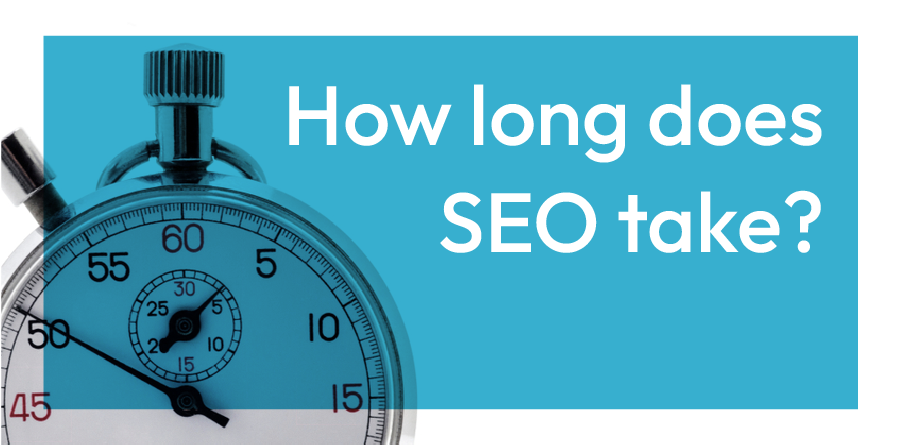How Long Does SEO Take?

The advantages of search engine optimization (SEO) are well-known, and most marketers are aware of the impact proper SEO practices can have. SEO has the ability to drive organic traffic, increase presence, improve reputation, and capture more leads — in short, changes that can have a significant benefit to your bottom line.
However, many marketers fail to realize that the effects of SEO won’t take place overnight. Due to the nature of SEO, the process moves slowly, and results make take time to see. Thus, for business owners considering SEO for the first time, timeline is often of upmost consideration.
So, how long before SEO shows results?
The answer is complex. However, the variables that impact when results can be seen are measurable, and these can be used to provide realistic estimates. Below, we explore the general answer, then dive in to six specific variables that impact timeline.
How Long Does SEO Take, Really?
There are dozens of variables that impact how long SEO takes, including the specific results a business is looking for. Some are immediate, others take longer. For example, certain keyword phrases with minimal competition could increase in rank from page three to page two within weeks.
However, organizations investing in SEO often expect #1 rankings, boosts in website traffic, and increased conversions. In general, websites begin to see results such as these within 4 to 6 months of starting SEO.
This may sound like a long time, but it's not like a light switch; you'll begin to see changes gradually on the road to the final outcome. While you wait, don't be afraid to make tweaks either; if Google changes algorithms or your company branches into new spaces, your SEO campaigns should reflect this.
The Variables
1. New websites vs established domains

Results will often take longer to see on a website with a brand new domain than on an established website domain. Most websites fall somewhere in-between.
New website domains tend to experience a period of rapidly changing rankings before the SERPs settle and consistent growth begins. Getting over this hump can take six months or more. The temptation to become easily excited or dissuaded during this period of fluctuation shouldn’t discourage long-term marketing investment.
Typically, established websites experience increased rankings and SERP settlement faster.
One final note: established domains that were previously penalized for malicious activity must re-establish trust and legitimacy on search engines.
2. Domain name
Although not a magic bullet technique, domain names with rich keywords can quicken SEO efforts. For example, a coffee shop with the domain localcoffeeshop.com may rank higher than their competitor (cupofjoe.com) for the keyword “local coffee shop.”
Of course, this is not an absolute variable. Domains with keywords can rank poorly, and domains without keywords often rank for a variety of valuable phrases.


3. Competition
Organizations offering a product or service that real people will acquire always face some degree of competition. A niche business in a small town will likely experience less competition than a real estate brokerage in New York City.
The level of competition your business encounters will impact the SEO timeline. Ranking difficulty and time-required-to-rank typically follow a bell curve.
We must note that budget plays a role. Large companies in competitive industries often have sizeable marketing budgets, allowing them to rank for competitive keywords quicker. Allocating the
right amount of money to marketing can give you a leg up on the competition.
What are SEO Services?
The Ultimate Guide for Businesses
You've decided SEO is right for your company. This guide covers how to hire a great SEO provider, what to expect, and what should be included in your service!
4. Inbound links
Inbound links play a significant role in SEO, impacting how fast results are seen.
Three primary factors influence results: number of links, quality of links, and the speed at which links are acquired.
- Number of links: generally, more links show Google value, helping your website rank quicker.
- Quality of links: links quality is equally important. Low-quality links from spammy websites can hurt your rankings and slow progress. Gaining quality links from relevant websites is key to positive growth.
- Speed of acquired links: links should be acquired over time, in a steady upward trend. An abrupt jump in link number could indicate a successful campaign, but it could also point to an unnatural means to manipulate rankings.

5. Keywords
Keywords are among the most noteworthy components of SEO as they have the power to drive targeted, conversion-ready traffic to your website. The competitiveness of your chosen keywords directly impacts how long it takes to see results. Highly competitive keywords, often targeted by many businesses, require more time and effort to rank for, while less competitive, niche keywords can yield quicker results. Additionally, the relevance and alignment of your keywords with user intent influence how effectively search engines match your content to queries. Strategic keyword research that takes user intent, search volume, difficulty, and relevance into consideration helps organizations not only see valuable results faster, but also supports achieving long-term visibility.
Want a free same-day SEO health scan?
No strings attached - receive a comprehensive report covering 140 unique data points about your website's technical SEO health in 24 hours or less!
Free SEO Health Scan (Main SEO Page)
6. Content
When it comes to SEO, the phrase "Content is King" holds true. High-quality, relevant content is a cornerstone of any successful SEO strategy and plays a significant role in determining how quickly you’ll see results.
Producing valuable content consistently is key to building authority and trust with both search engines and your audience. Search engines prioritize fresh, relevant, and comprehensive content that answers users’ queries effectively. The more quality content you produce, the more opportunities you create to rank for a variety of keywords, ultimately improving your visibility across multiple search queries. Aim for high-quality content that provides value to the reader. Word count suggestions can be helpful tools, but longer pieces are not always better. A 500-word blog that solves a visitor’s problem will often rank higher than a 2,000-word piece with unhelpful information.
However, it’s important to understand that content production is not a one-time effort. SEO is a marathon, not a sprint, and it requires a sustained commitment to creating and optimizing content over time. Regularly publishing well-researched articles, blog posts, and other forms of content helps keep your website active in the eyes of search engines, signaling that your site is a relevant source of information. Consistent publishing can encourage search engine spiders to crawl your website more frequently and motivate visitors to return to your site and discover new content.
The speed at which you produce and optimize content also impacts the timeline for SEO results. A robust content strategy that prioritizes keyword-rich, informative content tailored to your audience’s needs can accelerate your SEO efforts. On the other hand, if content creation is sporadic or lacks focus, it can slow down your progress.
In essence, while SEO takes time, a strong content strategy can significantly influence how quickly you achieve your desired results. The more valuable and optimized content you produce, the faster you’ll build the authority and relevance needed to climb the search engine rankings.
RivalMind: Results-Driven SEO
Managing client expectations is a core part of an SEO professional’s job. Search engine optimization services are a worthwhile investment, and organizations investing in SEO can expect plentiful long-term return.
At RivalMind, we offer results-driven SEO. Our services are backed by decades of experience working with clientele poised to grow. Let’s get in touch about the SEO health of your website. Give us a call at 331.228.9636 or submit an online inquiry.

Meet the Author
Josiah Flex
Director of Search Marketing
Josiah Flex, a digital marketer, is passionate about helping companies see real, lasting growth. With a background in personal training, he enjoys helping people identify and achieve their goals – from online visibility to increased leads. Ultimately, consumers use search engines, like Google, to identify the best answer for their needs, and companies engaged in great SEO have the highest likelihood of winning prospective consumers, one step at a time. This is true success.
Specialties: Building Client Relationships, RivalMind Hype Guy
Looking for more organic website traffic?
Welcome to RivalMind. Our purpose is to help your business thrive. We are a digital marketing agency that offers SEO, PPC, Web Design, Social Media and Video Solutions as tools to our clients for online business development and growth.
Contact us today to get started!
Blog Contact Form
Connect with Us:




